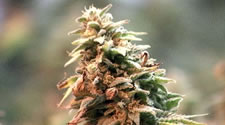 Mainstream media had a field day with the publication in the British Medical Journal of a 10-year study by Dutch researchers finding that people who use cannabis in their youth dramatically increase their risk of psychotic symptoms, and that continued use can raise the risk of developing a psychotic disorder in later life. Researchers led by Jim van Os from Maastricht University studied a random sample of 1,923 adolescents and young adults aged 14 to 24 years.
Mainstream media had a field day with the publication in the British Medical Journal of a 10-year study by Dutch researchers finding that people who use cannabis in their youth dramatically increase their risk of psychotic symptoms, and that continued use can raise the risk of developing a psychotic disorder in later life. Researchers led by Jim van Os from Maastricht University studied a random sample of 1,923 adolescents and young adults aged 14 to 24 years.
Press accounts did add lines like this one from Reuters on March 2: "But scientists say it is not yet clear whether the link between cannabis and psychosis is causal, or whether it is because people with psychosis use cannabis to self-medicate to calm their symptoms." However, they were equally quick to quote figures like Robin Murray of the Institute of Psychiatry at Kings College London, who was not involved in the research but nonetheless saw fit to weigh in: "This study adds a further brick to the wall of evidence showing that use of traditional cannabis is a contributory cause of psychoses like schizophrenia."
Contacted by Global Ganja Report, National Orgnization for the Reform of Marijuana Laws (NORML) deputy director Paul Armentano stated: "In my opinion, the association between cannabis use and mental health is complicated and not, at this time, well understood. Marijuana use likely does not cause schizophrenia, as worldwide rates of the disease remain unchanged since the 1950s despite dramatic increases in the use of the drug among the general population." He pointed to a study documenting this by Keele University Medical School, published in 2009 in the journal Schizophrenia Research.
Armentano further points out that if the self-medication thesis is correct, the correlation with cannabis use could actually indicate that the herb is having a positive impact. "Several studies show that schizophrenic patients report subjective benefits from cannabis," he says, pointing to one study published last year in the Canadian Journal of Nursing Research which found that subjects consumed cannabis to reduce anxiety, mitigate memories of childhood trauma, enhance cognition, and "improve their mental state."
Other studies find that schizophrenics who report using cannabis have objectively higher cognitive functioning than patients who have no history of use of the drug. Armentano points to such findings last year by the Feinstein Institute for Medical Research and co-researchers, also published in Schizophrenia Research.
Armentano offers these final thoughs: "Health risks connected with drug use when scientifically documented should not be seen as legitimate reasons for criminal prohibition, but instead, as reasons for legal regulation. After all, there are numerous adverse health consequences associated with alcohol, and it¹s precisely because of these effects that the product is legally regulated and its use is restricted to specific consumers and settings. Similarly, if there are legitimate mental health risks associated with use of cannabis by certain individuals then a regulated system would best identify and educate these people so that they may refrain from its use."
Mitch Earleywine, a psychology professor at SUNY Albany, points to probable flaws in the Dutch study's methodology. "People are more willing to admit to cannabis use than hard drug use, which might make cannabis look like the culprit when it's really hard drugs, particularly dopaminergic drugs like cocaine and amphetamine," he says.
Furthermore, "Some of the measures of psychotic symptoms are biased against cannabis users," says Prof. Earleywine. "In my work, I've shown that one of the items of the scale gets misinterpreted by cannabis users, making them look psychotic when they're not. The item 'I use words in unusual ways' is often endorsed by psychotic folks, but anyone who has kicked back with a joint at 4:20 might consider the slang a novel use of words, too."
Photo by Barbara Doduk







Comments
Does cannabis warp your brain?
That's the latest scare being avidly plugged by the media, based on findings published last week in the Journal of Neuroscience (PDF). Reads one typically uncritical account from I Fucking Love Science: "In this study, scientists used high-resolution MRI to scan the brains of 20 marijuana users and 20 non-users, between the ages of 18-25... The researchers found that the marijuana users, compared with the non-users, had structural abnormalities in gray matter density, volume and shape of two areas of the brain; the nucleus accumbens and amygdala. These regions have been implicated in reward and aversion and therefore likely play a role in addiction."
In a write-up of the findings, High Times notes the study's loaded language: "[W]hile the study's authors describe these changes as 'damage,' they also admit that the ramifications of these changes remains [sic] unknown." HT also points out that the US government itself holds a patent on use of cannabinoids as a neuroprotectant. Meaning that certain cannabinoids, at least, protect the brain. As the patent itself explains, “cannabinoids are found to have particular application as neuroprotectants, for example in limiting neurological damage following ischemic insults, such as stroke and trauma, or in the treatment of neurodegenerative diseases, such as Alzheimer's disease, Parkinson's disease and HIV dementia.”
We wish the media would hype this little-known fact a fraction as much as they are hyping the latest scare propaganda...